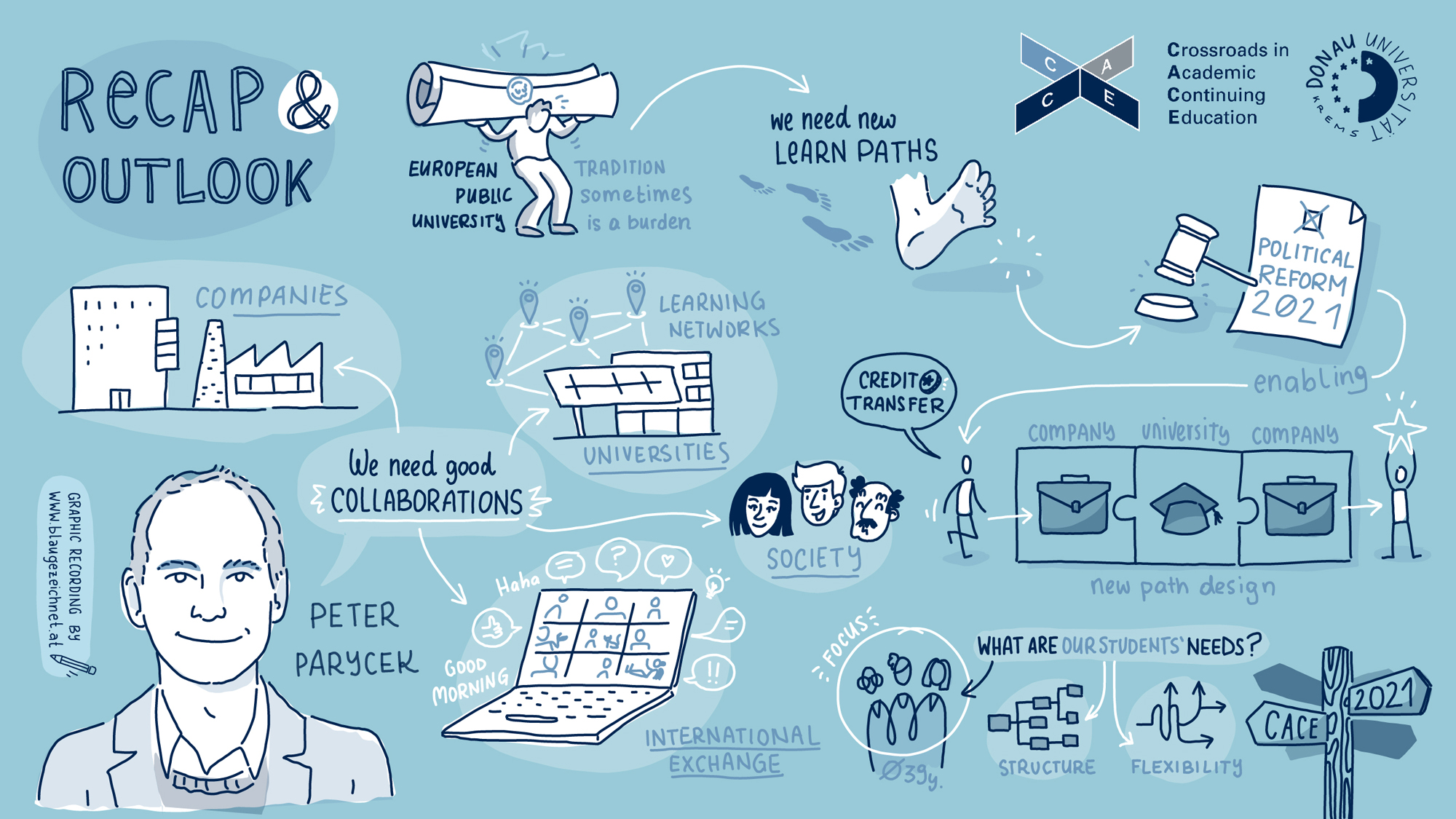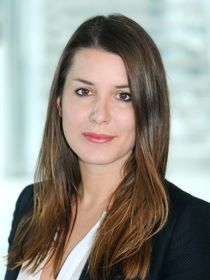The think tank CACE, founded in December 2020 by the University for Continuing Education Krems, brought together internationally renowned experts for lectures and discussions at the Assembly Beyond Borders on 1 October 2021. Thematic cornerstones were new study models, digital transformation and online learning, the role continuing education has to play in the university context, and skills required for the working world of the future.
In his welcoming speech, Friedrich Faulhammer, Rector of the University for Continuing Education Krems and initiator of CACE, emphasized the high relevance continuing education has, especially in the university context. This significance was further backed up by his reference to the meeting of EU heads of state and government in Porto in May 2021, where, among other things, the goal was set that by 2030 at least 60 percent of adults should be involved in continuing education measures each year. Therefore, as a leading university in the field of continuing education in Europe, finding answers to how continuing education will be structured in the future is a top priority.
Continuing education - a future topic for universities
Prof Antonio Loprieno, former rector of the University of Basel and president of the Austrian Science Council, addressed in his keynote address continuing education as an institutional USP. While continuing education used to be a marginal topic for universities, it has recently moved to the center, also due to its societal perspective. After a historical outline of university models that emerged at the turn of the 18th and 19th centuries, Loprieno looked at recent developments, such as the focus on innovation since 2015, that has been laid on applied science having an impact on the economy and society.
Close to the public and societal effectiveness
At present, universities are preoccupied with ecosystem trends and global challenges, Loprieno said. This is also where the translational component of continuing education comes into play, for example in the goal of teaching entrepreneurial skills. Universities with a focus on continuing education can make a significant contribution to innovation through their application-based approach with a simultaneous academic foundation, especially with their students, who are themselves employed and thus bring concrete, real-life issues to the universities. The transdisciplinary research approach often chosen in this context, as the University for Continuing Education Krems has decided as well, involves stakeholders outside the academic sphere, which opens new fields of action in the case of challenges such as climate change. Continuing education is close to the public due to the heterogeneous merge of of students, e.g. through science-society collaborations. In addition to the involvement of larger circles, a highly collaborative approach also entails risks, as the example of Wikipedia illustrates. Without definite authorship, there is an increased risk of fake news or at least a lack of factual substantiation. These wild growths must be put in check or "tamed," as Loprieno puts it. In this context, the importance science communication has, was underlined. At the same time, Loprieno also emphasized that science cannot always make clear statements, which became a challenge for communication during the pandemic.
(Continuing) educational paths for the future
Betty Vandenbosch dedicated her keynote speech to the promising aspects of online learning. She is Chief Content Officer at Coursera, a company that specializes in providing online continuing education courses. When COVID-19 suddenly caused an emergency online instruction it became the order of the day worldwide, and for many a first-time experience with this mode. However, it quickly became apparent that online learning was a remaining trend that would prevail even after the pandemic; after all, 85 percent of the students surveyed showed interest in video lectures. Vandenbosch identified four trends: Blended learning, which is the interweaving of synchronous and asynchronous teaching; a focus on career applicability; equitable access to content; and increased institutional collaboration.
Online teaching and blended learning provide more people with the flexibility to balance their studies with their family and work commitments, he said. The evidence of this can be seen in rising student numbers where more of these new options are being offered, Vandenbosch said.
Bringing job-relevant skills into the curricula
The topic of the labor market shifting and the question of which skills are actually relevant and important led directly to Jörg Schubert's remarks, a partner at McKinsey Dubai. He echoed Vandenbosch's comments by stating that half of the amount of all jobs could already be automated with the technologies available today. According to the OECD, 35 percent of people need new occupations. Of course, there are differences between the sectors, as Schubert explained. What is striking, he said, is that the nature of occupations is changing. His research showed that early adopters, those who responded early to the new trends, benefited disproportionately, which applied to companies and states alike. Following this "winner takes it all" principle, the disadvantages for late adopters are even more serious. A striking trend can be seen in the type of skill with which people spend most of their time at work today and in the future: While higher cognitive skills dominate today with almost half of the time (45 percent), in the future we will spend a good four-fifths of the working time on technological skills.
A survey deducting online 18,000 participants from 15 countries was used as a basis for measuring Distinct Elements of Talent, or DELTA for short, which does not refer to traditional skills or qualifications. In this way, 56 attributes were identified that would raise the chances of employment and correlate with a higher income. Job satisfaction, for example, was reflected in high scores for the DELTAs self-motivation and dealing with uncertainties. The analysis made clear that many DELTAs were not directly linked to education. How can these skills, such as creativity or self-confidence, find their way into university curricula?
Understanding the digital transformation in a comprehensive way across Europe
Susan Grajek is Vice President of Partnerships, Communities and Research at EDUCAUSE, a US-based non-profit association with the mission of advancing higher education using information technologies. In her keynote, she outlined the specifics of digital transformation, which she said is much more than simply digitizing data or processes. It involves fundamental change in the business model and strategy, for example. Recently, she has noticed that the commitment to online teaching has increased, of course also due to the current framework conditions. This is not a matter of course for higher education, she said, as it has to deal with legal obstacles such as some data protection issues as well as dwindling financial leeway. At the same time, she sees, as did the previous speakers, the broader access to higher education as an opportunity. A comprehensive transformation process could enhance both security and data protection.
Grajek sees great potential for digital transformation in four areas: improving education, advances in research, tightening administration and diversification, precisely through improved access for a larger group of people. It does not come as a surprise that the digital transformation processes were implemented more quickly because of the pandemic. Surveys conducted by EDUCAUSE before the pandemic and in 2021 showed the extent of this effect: Whereas before the pandemic only 13 percent of institutions stated that they were implementing digital transformation processes, this figure rose to 44 percent.
Redefining study concepts
Prof George Iwama, President and Vice-Chancellor of Quest University Canada, presented an innovative approach to education. He exemplified an innovative approach to education at Quest University, Canada's first private, non-profit secular liberal arts and sciences university.
The block system is the first distinction from the typical study organization: instead of several courses running in parallel, students always focus exclusively on one course, which operates as a block over three and a half weeks in small groups. The studies are split into the founding study program during the first two years, and the concentration program during the last two years. Transferable skills would be acquired in all studies, for example, a rhetoric course would be mandatory for all students in the foundation program. At the end of these two years, he said, students develop a research question that is addressed academically in the second half of the study. To that end, the courses in the second half of the study are individualized and are used to prepare for the Keystone Project. As an example, Iwama cited the initial question, "What is the nature of olive oil?" which has been explored in courses in sociology as well as economics, nutrition, biochemistry, and international trade. This strongly interdisciplinary approach also reflects in the organizational structure, without a classical departmental structure. Furthermore, the credo "the world as a learning environment" is considered by requiring all students to participate in at least one block of "experiential learning" in which hands-on learning complements their course schedule and reflects their academic interests and their questions. This is also possible within the Study Abroad program, he said.
Online teaching has chances and challenges
Later, in the discussion, participants' questions were taken up by the speakers. The topic of fair access to knowledge was addressed, especially regarding less privileged social classes and poorer countries. In this context, Jörg Schubert pointed out that the DELTA concept is of relevance here, as the competitive advantage of cheap labor will dwindle as a result of automation. The new challenge of "digital fatigue" caused by extended online sessions was also raised. Here, it was pointed out that a change of channel - telephone calls instead of video calls - would help, as would a high level of interaction, which Betty Vandenbosch pointed out. About drop-out rates, she referred to the high intrinsic motivation of online learners. Low-threshold technical courses are also important, she said, so that the lack of digital skills does not become an obstacle for those who want to learn. Differences in organizational structure were still evident around collaboration between universities and companies: universities, as institutions that have generally grown historically, tended to focus on a long-term perspective, while companies tended to push for swift implementation.
Following new educational paths due to the amendment of the UG
In his concluding remarks, Prof Peter Parycek, the event’s host and Vice-Rector for Educational Affairs/Academic Continuing Education and Digital Transformation (CDO) at the University of Continuing Education Krems, discussed the topic of cooperation, pointing out that universities are often discerned as closed systems, yet this is already less the case in research than in teaching. The design of new (continuing) education paths, he saw as an important current challenge, where it is a matter of ensuring the change and creditability of non-university qualifications, basic and continuing education studies, for example through the "Bachelor of Continuing Education". In this respect, the current amendment to the Universities Act (UG) in Austria opens new scope for application. Structures, in their design fresh and flexible, would contribute to making it possible to study alongside one's job and family life.
The event drew a great response, with around 200 registrations from various parts of the world, ranging from Austria and Europe - including Oxford University - to interested parties from Singapore, China, India, Kazakhstan, and the USA.
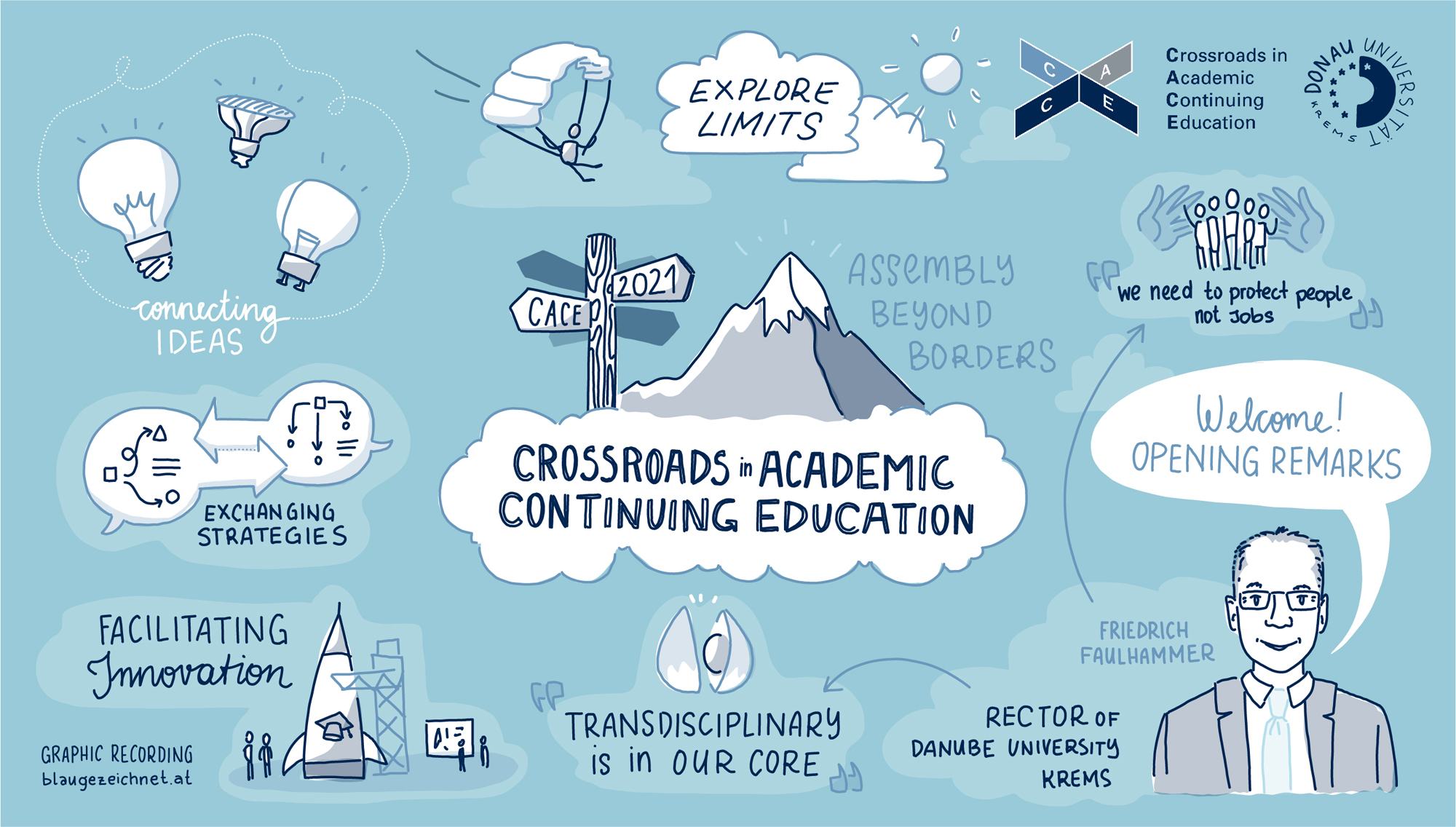
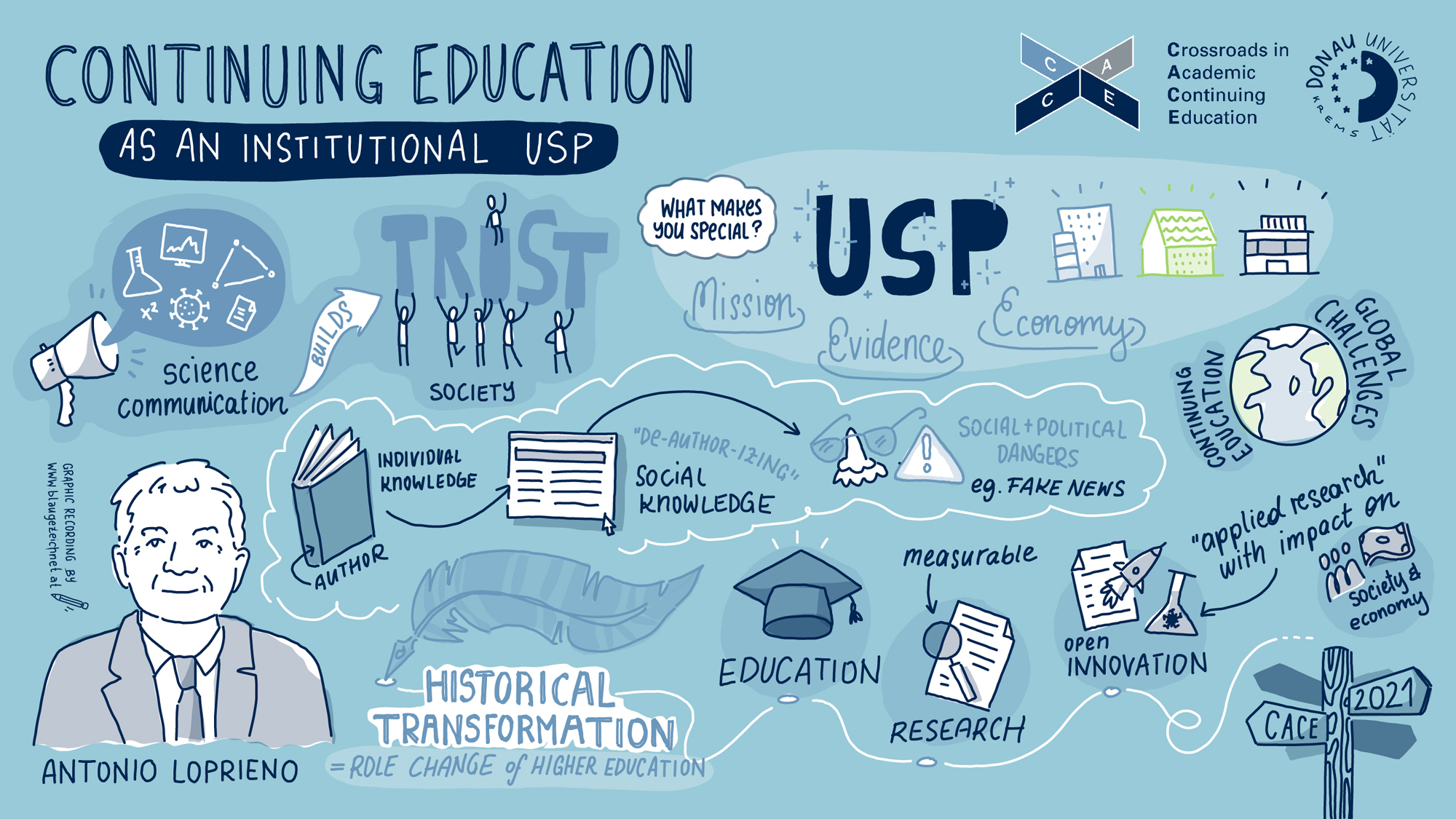
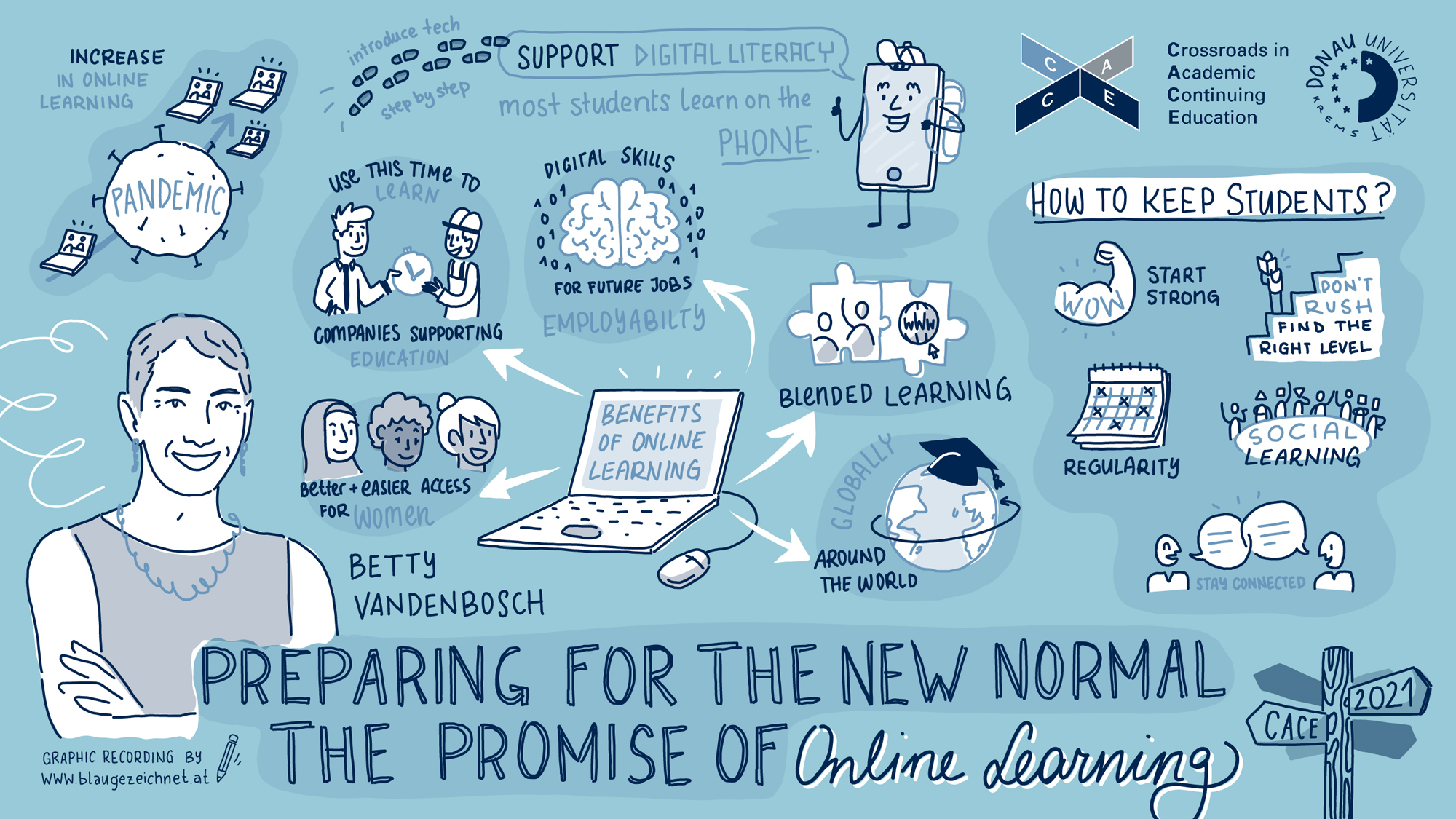
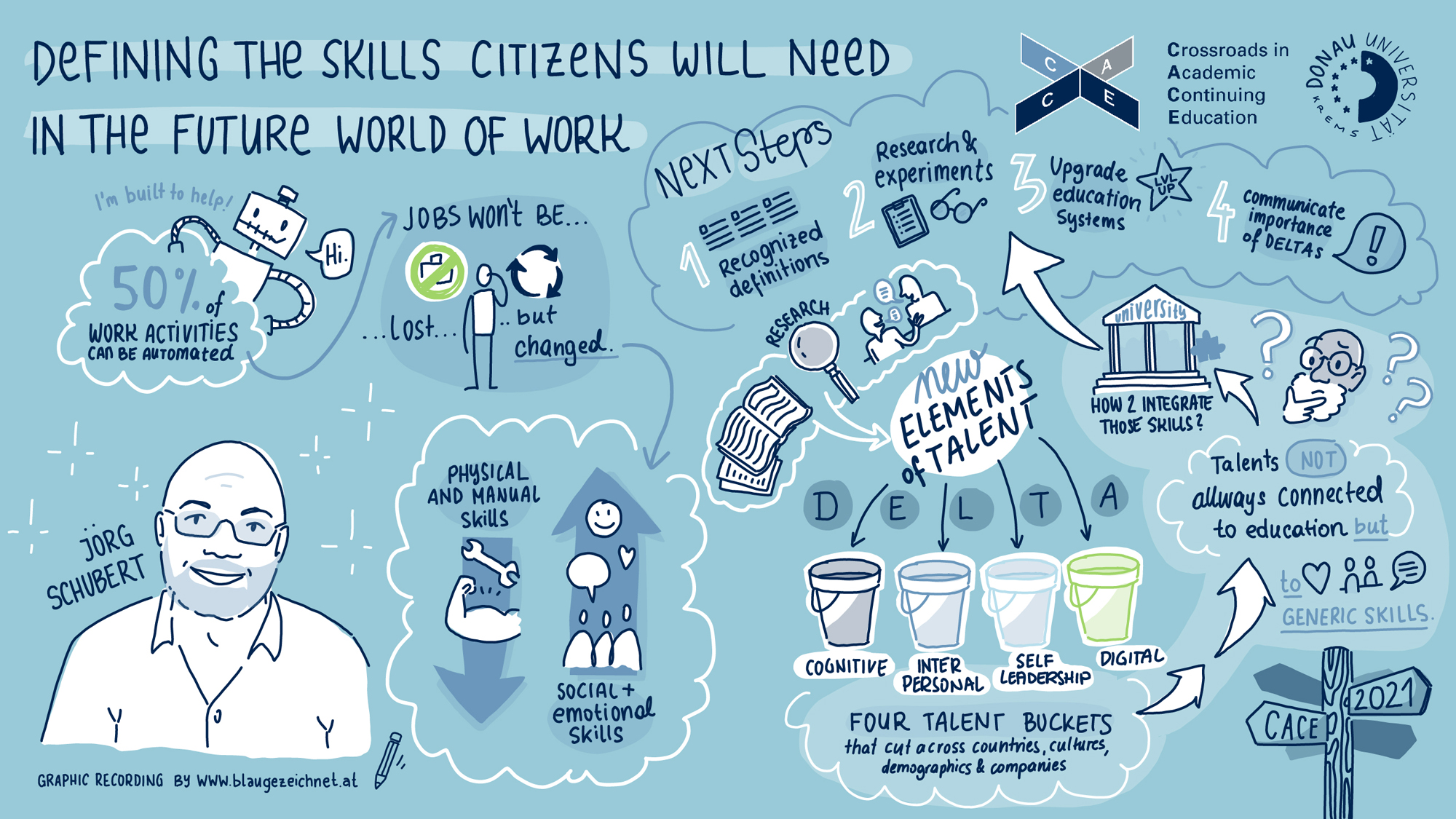
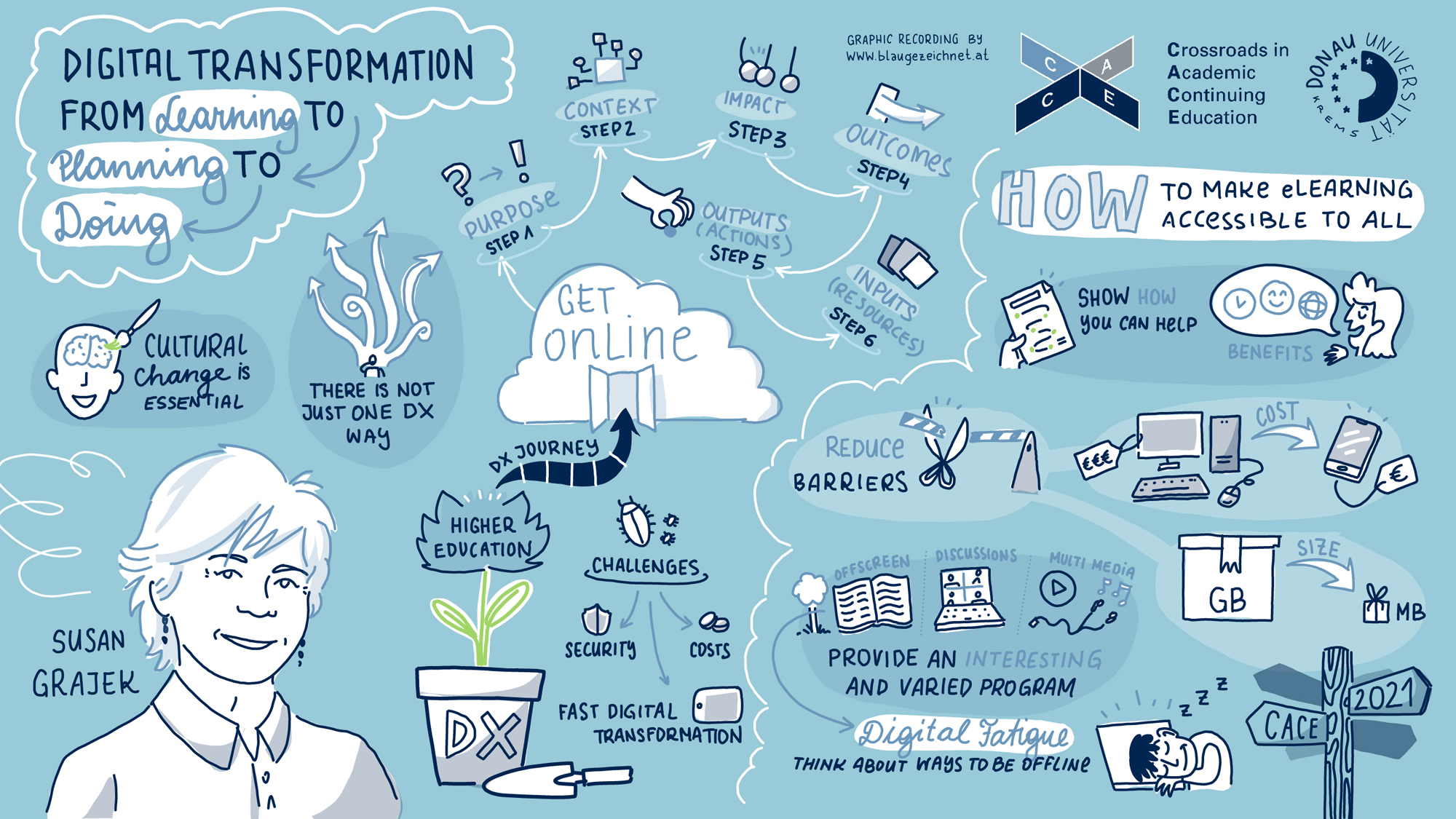
blaugezeichnet%20WEB.jpg)
